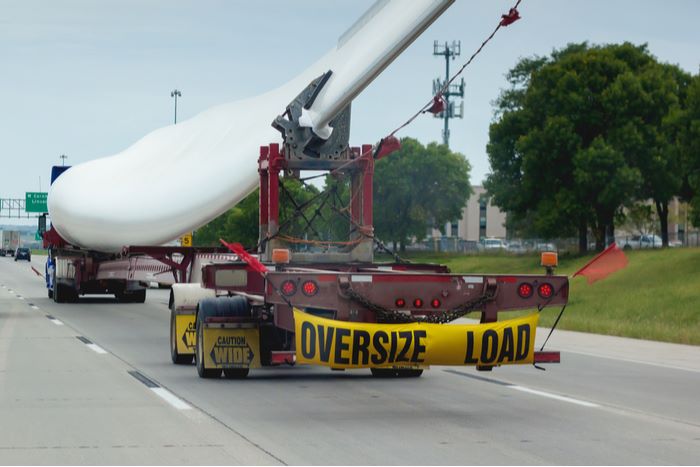
US states and municipalities are ramping up permitting for oversize-overweight shipments after a pandemic slowdown. Photo credit: Shutterstock.com.
Shippers moving oversized, overweight loads face a unique constraint on capacity that is pushing up their transportation costs: the time required to obtain permits to move those shipments from US states and Canadian provinces. Most states now have automated systems for issuing oversize/overweight (OS/OW) permits, but oversized shipments moving through multiple states have faced delays.
The situation is improving rapidly as the US economy expands and the US continues to roll out vaccinations against the coronavirus disease 2019 (COVID-19), speakers said at the virtual JOC Breakbulk and Project Cargo Conference last month. In fact, the pandemic may have given a shot in the arm to efforts to increase automation of the state permitting process for OS/OW shipments.
“Permitting has always been a problem, the biggest,” said Wesley Knapp, manager of nuclear and large projects for Edwards Moving & Rigging, a specialized trucking company. It is not an insoluble problem, though. “Various states are getting their permitting not only back on track, but actually enhancing their permitting process through automation,” said Knapp. “Permitting is getting back to the pace we saw prior to the pandemic. The other challenge we see on the heavy-haul side is infrastructure.”
As the COVID-19 pandemic spread in 2020, permitting slowed “to a very slow pace,” said Knapp, whose Kentucky-based trucking company specializes in heavy loads of all types and specialized rigging for construction projects. The slowdown was largely because many state transportation personnel responsible for permitting were working from home or had been furloughed, Knapp said.
“I can tell you that in the last 30 days, we've seen a tremendous ramping up on permits,” he said.
Diverted cargo requires more permits
That ramp-up is becoming even more important as shipping routes to construction points or project locations are complicated by congestion at major US ports, such as Los Angeles and Long Beach in California. Knapp and other speakers noted congestion has caused delays in unloading project cargo that moves overland by specialized carrier. What’s more, diversion of cargo can dramatically change routes traveled.
“We’ve felt the pinch all along the West Coast for product that we were trying to bring into the US,” said Jeromy Hofmeister, manager of procurement and logistics for Vogt Power International. "Some of the pain we’ve felt is from cargo that was diverted from Long Beach and is now increasing the traffic and congestion at other West Coast ports that traditionally haven't seen as much of that project cargo.”
Diverting cargo from Long Beach to Houston, Texas, or the US East Coast could mean adding a dozen new states to the inland route. That means securing capacity in different markets, typically at a higher price, and getting more OS/OW permits. That can lead to oversized cost increases for project shippers.
There have been strides toward greater automation and quicker permitting over the past decade. Software company ProMiles has designed and built paperless, cloud-based OS/OW permitting systems for 15 states, starting with Texas in 2011. The Specialized Carriers & Rigging Association (SCRA) is pushing for harmonized and automated OS/OW permitting procedures among the states.
“Each governing agency creates its own set of challenges,” said Knapp. He was not just referring to states, but to municipalities as well. “We are seeing states definitely moving toward automated systems. I think in some states, the pandemic actually accelerated their kickoff time, as automation is helping them in the recovery process. Those states are really doing well right now because of that acceleration.”
"heavy" - Google News
June 08, 2021 at 08:56PM
https://ift.tt/2Ti9Tyc
Breakbulk trucking: Heavy-haul permitting delays eased by automation - JOC.com
"heavy" - Google News
https://ift.tt/35FbxvS
https://ift.tt/3c3RoCk
heavy
Bagikan Berita Ini















0 Response to "Breakbulk trucking: Heavy-haul permitting delays eased by automation - JOC.com"
Post a Comment